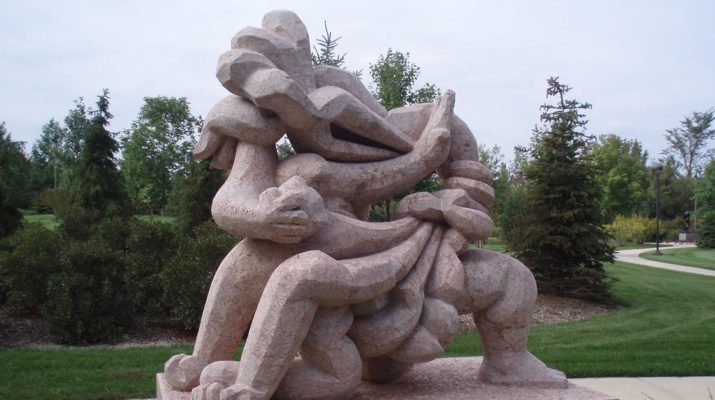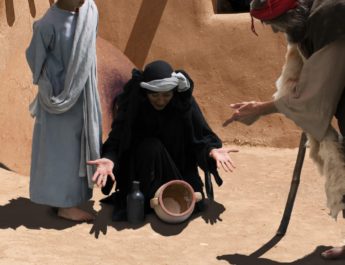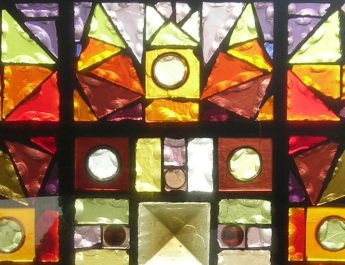Genesis 21:8-21
Ordinary A30
BibleHub
8 The childA grew,B and was weaned;C and AbrahamD made a greatE feastF on the day that IsaacG was weaned.
Notes on verse 8
A “child” = yeled. From yalad (to bear, bring forth; can mean to act as midwife or to show one’s lineage). This is something born – so, offspring, youth, fruit.
B “grew” = gadal. This is to grow up, become great, become wealthy – to advance. The root meaning may be to twist in the sense of the process of growing.
C “weaned” = gamal. This is how one deals with someone whether positively or negatively – so to reward, requite. It can also mean to wean or the work that goes into something ripening.
D “Abraham” = Abraham. From the same as Abiram (exalted father, a high father – lofty) {from ab (father literal or figurative) + rum (rise, bring up, being high, extol, exalt, haughty; to raise in a literal or figurative sense)}. This is Abraham, father of many nations or father of a multitude.
E “great” = gadol. Related to “grew” in v8. From gadal (see note B above). This is great, high, bigger, noble, old, marvelous. It can also refer to someone who is powerful or distinguished.
F “feast” = mishteh. From shathah (to drink literally or figuratively; a drinker). This is drink or the act of drinking. So it is a feast or banquet, as occasions with drinking.
G “Isaac” = yitschaq. From tsachaq (to laugh, mock, play, make sport; this is laughing out loud whether in joy or in a scornful way). This is Isaac, meaning “he laughs.”
9 But SarahH saw the son of HagarI the Egyptian,J whom she had borneK to Abraham, playingL with her son Isaac.
Notes on verse 9
H “Sarah” = sarah. From the same as sarah (princess, mistress, noble lady, queen); from sar (chief, ruler, captain, official, prince). This is Sarah, meaning princess.
I “Hagar” = hagar. 12x in OT. Perhaps from hagar (fleeing; a stranger or foreigner) OR from ha (the) + garar (to drag out or away) OR from Persian/Greek aggareuo (to press into service). This is Hagar. See https://www.abarim-publications.com/Meaning/Hagar.html#.Xh-BtUdKhPY and https://en.wiktionary.org/wiki/Hagar
J “Egyptian” = mitsri. From the same as mitsrayim (Egypt); perhaps from matsor (besieged or fortified place, bulwark, entrenchment; something hemmed in; a siege or distress or fastness); from tsur (to confine, besiege, to cramp). This is Egyptian.
K “borne” = yalad. Related to “child” in v8. See note A above.
L “playing” = tsachaq. Related to “Isaac” in v8. 13x in NT. See note G above.
10 So she said to Abraham, “Cast outM this slave woman with her son; for the son of this slave woman shall not inheritN along with my son Isaac.” 11 The matterO was very distressingP toQ Abraham on account of his son.
Notes on verses 10-11
M “cast out” = garash. This is to cast out or expel. It can be to exile someone or to divorce them.
N “inherit” = yarash. This is inheriting or dispossessing. It refers to occupying or colonizing – taking territory by driving out the previous inhabitants and living there instead of them. By implication, it can mean to seize or rob, to expel, ruin, or impoverish.
O “matter” = dabar. From dabar (to speak, declare, discuss). This is speech, a word, a matter, an affair, charge, command, message, promise, purpose, report, request. It is a word, which implies things that are spoken of in a wide sense.
P “was…distressing” = ra’a’. Literally, this is to destroy something by breaking it into pieces. Figuratively, it is to cause something to be worthless or bad physically, socially, or morally. This word can be to be evil, bad, afflict, displease, harm, break down, do mischief. This is the root where the Hebrew word for “evil” comes from. The concept includes anything that is not how it ought to be: a natural disaster, a disfigurement, illness, pain, sin, wickedness, etc. It is less that a hurricane or deformity is evil and more that it goes against how God generally orders the universe. Here, harm and destruction is categorically said to be antithetical to God’s will for humanity.
Q “to” = ayin. Literally “in the sight of.” This is eye in a literal or figurative sense so eye, appearance, favor, or a fountain (the eye of the landscape).
12 But GodR said to Abraham, “Do not be distressedS because of the boyT and because of your slave woman; whatever Sarah says to you, do as she tells you,U
Notes on verse 12a
R “God” = Elohim.
S {untranslated} = ayin. Literally “in your sight.” Same as “to” in v11. See note Q above.
T “boy” = naar. May be from na’ar (to shake, toss up and down, tumble around). This is a child or a servant. It is a child in their active years so they could be aged anywhere from infancy to adolescence.
U “do as she tells you” = shama + qol. Literally “listen to her voice.” Shama is to hear, call, consent, or consider. It implies listening intelligently, giving attention, and, because of these two factors, obedience and action are often implied. Qol is a sound, used often for human voices. Also used when God speaks or angels, animals or instruments. It can be a cry or a noise, thunder or earthquakes and so on.
for it is through Isaac that offspringV shall be namedW for you. 13 As for the son of the slave woman, I will makeX a nationY of him also, because he is your offspring.”
Notes on verses 12b-13
V “offspring” = zera. From zara (to sow or scatter seed; conceive or yield). This is seed or sowing. It can, thus, mean a fruit, plant, sowing time, child, offspring, or posterity.
W “named” = qara. This is to call or call out – to call someone by name. Also used more broadly for calling forth.
X “make” = sim. This is to put or place in a literal or figurative sense. It can be appoint, care, change, make, and may other things.
Y “nation” = goy. From the same root as gevah (the back, person, or body); related to gev (among); related to gaah (to rise up). This is nation or people. Often used to refer to Gentiles or foreign nations. It can also be used figuratively for a group of animals. This is where the Yiddish “goy” comes from.
14 So Abraham rose earlyZ in the morning,AA and took breadBB and a skinCC of water, and gave it to Hagar, puttingDD it on her shoulder,EE along with the child, and sent her away.FF
Notes on verse 14a
Z “rose early” = shakam. This is leaning one’s shoulder into a burden or load, whether a person or an animal. Thus, it meant starting or rising early.
AA “morning” = boqer. From baqar (to seek, plow, break forth, admire, care for). This refers to the break of day. So it is dawn, early, morning, or morrow.
BB “bread” = lechem. From lacham (to eat, feed on). This is bread, food, loaf. It can refer to food more generally for people or for animals.
CC “skin” = chemeth. 5x in NT. Perhaps from the same as chomah (a wall for protection); from the same as cham (father-in-law – one’s husband’s father; perhaps from a root meaning to join). This is a waterskin or bottle.
DD “putting” = sim. Same as “make” in v13. See note X above.
EE “shoulder” = shekem. Perhaps related to “rose early” in v14. Perhaps from shakam (see note Z above).
FF “sent…away” = shalach. This is to send out, away, send for, forsake. It can also mean to divorce or set a slave free.
And she departed, and wanderedGG about in the wildernessHH of Beer-sheba.II 15 When the water in the skin was gone,JJ she castKK the child under one of the bushes.LL
Notes on verses 14b-15
GG “wandered” = taah. This is to wander, deceive, seduce, vacillate. It is to stray in a literal or figurative sense.
HH “wilderness” = midbar. Related to “matter” in v11. From dabar (see note O above). This is mouth or speech. It can also be desert or wilderness. Additionally, it can be used for a pasture to which one drives cattle.
II “Beer-sheba” = beerah shaba. From beer (a well or pit); {from baar (to make plain,; to dig; can also mean to engrave or figuratively to explain)} + perhaps from shaba (to swear, curse, vow, make a covenant; properly, to be complete; this is to seven oneself – as in affirming something so strongly it is as though it were said seven times) {perhaps from sheba (seven – the number of perfection/sacred fullness)}. This is Beersheba – meaning either “well of seven” or “well of an oath.”
JJ “was gone” = kalah. This is to end, be finished, complete, prepare, consume, spent, or completely destroyed.
KK “cast” = shalach. Same as “sent…away” in v14. See note FF above
LL “bushes” = siach. 4x in NT. Perhaps from siach (to muse, meditate, complain, sing, sigh, speak, or utter); perhaps from siach (musing, meditation, communication, babbling, prayer, contemplation). This is a bush, shrub or plant. Perhaps it is a shoot as though it was expressed by a plant.
16 Then she went and sat downMM opposite him a good way off, about the distance of a bowshot;NN for she said, “Do not let me look on the deathOO of the child.” And as she sat opposite him, she lifted up her voicePP and wept.QQ
Notes on verse 16
MM “sat down” = yashab. This is to sit and so to remain and so to dwell. It is sitting for any reason – as a judge, in order to ambush, or just sitting quietly. Causatively, this can mean settling or marrying. This can also mean continue, endure, or establish.
NN “bowshot” = tachah + qesheth. Tachah is 1x in OT. It can mean simply to shoot or it can refer to drawing back a bow as someone who shoots an arrow does. Qesheth is perhaps from qush (to set a trap, lure, ensnare) OR from qashah (to be fierce, cruel, dense, tough, severe). This is a bow, arrow, or archer. Bow can be used figuratively for strength.
OO “death” = mavet. From muth (to die in a literal or figurative sense). This can be death, deadliness, the dead, or the place where the dead go. It can be used figuratively for pestilence or ruin.
PP “voice” = qol. Same as “do” in v12. See note U above.
QQ “wept” = bakah. This is to weep, complain, or lament.
17 And God heardRR the voice of the boy; and the angelSS of God calledTT to Hagar from heaven,UU and said to her, “What troubles you, Hagar? Do not be afraid;VV for God has heard the voice of the boy where he is.
Notes on verse 17
RR “heard” = shama. Same as “tells” in v12. See note U above.
SS “angel” = malak. This is a messenger, an angel, or a deputy of some kind. Can be used for human messengers literally or for prophets, priests, or teachers as messengers of God. Also used for supernatural messengers i.e. angels.
TT “called” = qara. Same as “named” in v12. See note W above.
UU “heaven” = shamayim. Root may mean being lofty. This is sky, the air, or heaven. It is in a dual noun form so this might refer to the part of the sky where the clouds move on the one hand and the part beyond that where the sun, moon, and stars are on the other hand.
VV “be afraid” = yare. This is to fear, be afraid, dreadful. It can also refer to fearful reverence – to fear in a moral sense is to say to revere, respect.
18 Come,WW lift up the boy and hold him fastXX with your hand, for I will makeYY a great nation of him.” 19 Then God opened her eyes and she saw a wellZZ of water. She went, and filled the skin with water, and gave the boy a drink.
Notes on verses 18-19
WW “come” = qum. To arise, stand, accomplish, establish, abide. This is rising as in rising against, getting up after being sick or asleep, arising from one state to another, becoming powerful, or rising for action. It can also be standing in a figurative sense.
XX “hold…fast” = chazaq. This is to strengthen, seize, be courageous, repair, bind, heal, conquer, harden.
YY “make” = sim. Same as “make” in v13 & “putting” in v14. See note X above.
ZZ “well” = beer. Related to “Beer-sheba” in v14. See note II above.
20 God was with the boy, and he grew up; he livedAAA in the wilderness, and became an expertBBB with the bow.CCC 21 He lived in the wilderness of Paran;DDD and his mother got a wife for him from the land of Egypt.
Notes on verses 20-21
AAA “lived” = yashab. Same as “sat down” in v16. See note MM above.
BBB “expert” = rabah. This is increasing in any aspect whether quantity, authority, size, quality, greatness, etc.
CCC “bow” = qashshath. Related to “bowshot” in v16. 1x in OT. From the same as qesheth (see note NN above). This is a bowman or archer.
DDD “Paran” = paran. 11x in OT. From the same as porah (a branch or spring; properly, ornamentation); perhaps from pa’ar (to beautify or adorn, to gleam; can refer to showing honor or glorifying someone; also to boast or to shake a tree for harvest). This is Paran, perhaps meaning ornamental.
Image credit: “Hagar” by Jacques Lipchitz, installed in the Meijer Gardens and Sculpture Park, 1971.




